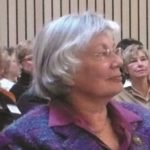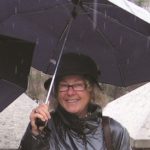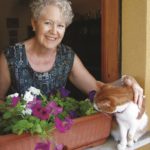Portrait des Coordonnateurs Linguistiques de l'ICB
Jutta Tagger, rédactrice en chef honoraire de l’ICB
Vous êtes-vous déjà demandé comment le Bulletin Choral International peut être publié tous les trois mois dans quatre langues? Qui est derrière tout ce travail ? A vrai dire, sans un véritable bataillon de bénévoles, ce serait impossible.
Pour chacune de ces quatre langues un coordonnateur (en ce moment, il s’agit de coordonnatrices) reçoit l’ensemble des textes à traduire dans la langue dont il est responsable. À lui de trouver alors, au sein d’un vivier – en perpétuelle évolution – des gens qui ont du temps et les compétences requises afin d’effectuer ce travail. Les traductions devront ensuite être à nouveau compilées et mises au “format ICB”. Avant l’impression, elles seront également contrôlées par une autre personne en ce qui concerne le style, la typographie, les contresens, etc. Parfois les articles doivent être aussi être adaptés avant d’être traduits, vu que de nombreux auteurs n’écrivent pas dans leur langue maternelle. C’est un travail considérable et chronophage : nous sommes extrêmement reconnaissants envers les personnes qui se dévouent pour ce processus ; en effet, sans eux, la forme de votre ICB serait beaucoup moins aboutie et le fond moins accessible à tous.
Nous voudrions vous présenter aujourd’hui les quatre coordonnatrices linguistiques
– GFH (Gillian Forlivesi Heywood, anglais),
– HB (Helen Baines, espagnol),
– LA (Laure Auerbach, allemand) et
– MB (Maria Bartha, français).
Nous leur avons transmis un petit questionnaire auquel ces quatre femmes ont bien voulu répondre. Nous leur avons également demandé de nous remettre une courte biographie ainsi qu’une photographie.
Nous vous souhaitons une bonne lecture afin d’apprendre à les connaître et d’apprécier leurs efforts.
Nous avons agencé les questions et les réponses des quatre coordinatrices à la suite :
Êtes-vous – ou avez-vous été – impliquée, de quelque manière, que ce soit dans la musique, et plus précisément dans la musique chorale ?
LA : J’ai une formation de professeur de musique. J’ai chanté dans des chorales pratiquement toute ma vie, j’ai dirigé toutes sortes de chœurs, et je chante encore aujourd’hui dans deux chorales.
HB : Oui, j’ai commencé à chanter à 11 ans dans la chorale de mon école, et je ne me suis jamais arrêtée : à l’Université de Leeds, à la Société Harmonique de Nottingham, dans les chœurs de l’université de Valence et de Murcie en Espagne. Puis, depuis que je suis à la retraite, dans trois chorales animées par des retraités originaires d’Europe du Nord et résidant sur la Costa Blanca, sans oublier le séminaire choral estival dans les Alpes italiennes.
MB : Oui, depuis ma tendre enfance jusqu’à ce jour. J’ai toujours eu deux passions : la musique et les langues étrangères. La musique a toujours fait partie de ma vie et a toujours été présente dans mon cœur. J’ai chanté dans des chorales pratiquement toute ma vie. J’ai aussi participé à l’organisation d’ateliers musicaux et d’échanges entre chœurs. J’ai beaucoup de souvenirs de ces événements, ainsi que des Choralies.
GFH : Ma mère jouait très bien du piano (instrument que je n’ai, malheureusement, jamais appris) : on peut donc dire que j’ai grandi dans la musique, même si je ne suis pas une musicienne aguerrie, rien qu’une vraie mélomane amateur ! Quand j’étais au lycée, le professeur de musique transcrivait souvent des morceaux pour trois voix (des voix de femmes, puisque c’était un établissement pour filles). Il y avait environ 750 élèves, et le résultat était donc assez impressionnant ! En ce moment je chante dans une chorale d’amateurs.
Comment avez-vous commencé à travailler pour l’ICB ? Et quand ?
LA : En 1961 je participais au premier festival Europa Cantat à Passau (Allemagne) en tant que chanteuse. Ensuite, comme présidente de l’association chorale allemande “Arbeitskreis Musik in der Jugend”, je suis entrée en contact avec la Fédération Européenne des Chœurs de Jeunes (dont j’ai été la vice-présidente pendant un mandat). Je suis membre de la FIMC depuis sa création et j’ai participé à son premier symposium, à Vienne en 1987.
HB : Un jour, il y a environ 12 ans, un de mes voisins, jeune professeur au conservatoire m’a refilé le virus : il avait une échéance à honorer pour une traduction de l’ICB. J’ai eu pitié de lui, et ai fait ce travail pendant qu’il était chez le coiffeur en prévision de son récital de clavecin.
MB : En naviguant sur Internet à la recherche des actualités sur les Choralies, j’ai appris que l’ICB cherchait un coordonnateur pour les traductions françaises. J’ai pensé que ce serait un défi intéressant après ma retraite, en rapport avec l’activité chorale que je voulais continuer. Depuis mes débuts en 2010 j’ai beaucoup de plaisir à effectuer ce travail, avec ses défis. Il me permet de rester en contact permanent avec les événements liés à la musique chorale dans le monde entier.
GFH : J’ai commencé en janvier 2010 : Andrea Angelini, rédacteur en chef de l’ICB, est aussi chef, organisateur et inspirateur du Chœur de Chambre Carla Amori, dont j’ai la chance de faire partie. Nous nous connaissons depuis plus de vingt ans : donc, quand le besoin d’un coordonnateur pour la langue anglaise s’est fait sentir, j’étais la candidate toute trouvée !
Comment vous êtes-vous intéressée à la coordination de traductions ? Aviez-vous une expérience antérieure de ce genre de travail ?
LA : J’ai passé les deux tiers de ma scolarité en Angleterre, et j’ai grandi en étant bilingue : l’allemand à la maison, l’anglais partout ailleurs. Des langues différentes reflètent des manières différentes de voir la même chose ; cela m’a toujours intéressée. Avant de travailler pour l’ICB, je traduisais déjà des articles pour le magazine d’Europa Cantat. Et en tant qu’étudiante, je gagnais une partie de ma vie en faisant de l’interprétation simultanée à temps partiel.
HB : Je ne l’avais vraiment jamais fait : un jour où je me suis proposée pour faire une traduction, Andrea Angelini a dit qu’ils avaient besoin d’un coordonnateur pour l’espagnol, et je me suis lancée. Voilà : les ordres sont les ordres. Je n’avais jamais rien fait de similaire auparavant, mais j’avais été jurée à l’Université de Cambridge pour des épreuves de langues, donc j’imagine que cela m’a qualifiée.
MB. Comme je l’ai déjà mentionné, les langues étrangères sont l’une de mes passions. J’ai toujours travaillé pour des organisations internationales aux côtés d’équipes cosmopolites. J’étais chargée, entre autres, de la coordination des traductions dans cinq langues des comptes-rendus de réunions, de résolutions et de documents des congrès.
GFH : Si je m’y suis intéressée, c’est seulement parce qu’Andrea m’a demandé de faire ce travail ! Non, je n’avais absolument aucune expérience dans ce domaine, si ce n’est comme jurée lors des épreuves orales des examens ESOL de Cambridge ; en revanche j’ai le sens de l’organisation, ce qui facilite les choses.
Qu’est-ce qui vous motive ? Comment évaluez-vous votre contribution à l’ICB ?
LA : Ce qui me motive c’est de contribuer à rendre tous les articles intéressants de l’ICB accessibles à des gens qui ne maîtrisent pas suffisamment la langue anglaise. J’estime donc que ma contribution est très importante.
HB : Je suis extrêmement motivée : aujourd’hui retraitée d’un travail très accaparant que j’ai eu de longues années durant, j’estime avoir encore quelque chose à offrir à la société. Être en contact dans plusieurs langues avec toutes sortes de gens intéressants via l’ICB : quel plaisir !
MB : Ma motivation était de jumeler mes deux passions pendant ma retraite. C’est exactement le domaine dans lequel il est possible de mettre en œuvre mes deux compétences ! C’est aussi intéressant du point de vue humain, de travailler avec des gens enthousiastes qui partagent les mêmes valeurs, d’apprendre plein de choses sur la musique chorale, et d’être en contact avec des musiciens. Ce travail requiert de forts talents d’organisation, pas toujours faciles à mettre en œuvre. En plus, l’approche des échéances génère du stress ; par exemple lorsque les textes n’arrivent pas à temps, ou que les gens ne sont pas disponibles pour les relire. . C’est toutefois une activité très plaisante ! Il y a des défis de taille, tout en étant en contact avec des gens qui se comprennent dans la langue universelle qui est la musique, mais qui communiquent aussi dans leur propre langue. Notre travail contribue donc à mieux se comprendre.
GFH : Ma motivation est d’apporter aux autres (et en particulier à Andrea) quelque chose en retour du plaisir que je retire en chantant dans le chœur. Pour ce qui est de la valeur de ma participation, j’espère, par l’intermédiaire de l’ICB, permettre à la musique chorale de prendre vie auprès de plus en plus de gens : chanter ensemble est une expérience merveilleuse et cela crée de véritables liens entre les gens.
Quelles sont vos relations avec les bénévoles dans votre équipe ?
LA : Je traduis et je corrige des articles pour l’ICB depuis très longtemps, mais ce n’est que depuis les deux derniers numéros que j’effectue des tâches de coordination. En ce qui concerne les questions des traducteurs au sujet des articles, je m’efforce de les connaître personnellement de mieux en mieux, hélas exclusivement par e-mail. Mais peut-être aurai-je l’occasion de rencontrer l’un ou l’autre en chair et en os !
HB : Au début j’étais un peu perplexe parce que je ne connaissais ou n’avais de références d’aucun membre de mon équipe. De plus, lorsque l’on échange en espagnol, il faut être assez prudent parce que, même si de nos jours en Espagne les gens sont très détendus (trop ?) et utilisent le “tu” pour conjuguer les verbes, en Amérique du Sud, ils continuent d’utiliser la forme de politesse “usted” : je redoutais donc de choquer des gens en formulant les phrases d’une manière inadaptée. Mais j’ai maintenant des correspondants vraiment exquis, attachants et remplis d’humour.
MB : Notre équipe est comme une famille partageant des intérêts communs. Même si nous ne nous connaissons que virtuellement, nous avons une entente très amicale et nous tenons informés les uns les autres de notre vie en dehors des traductions et du travail. Vu que personne n’a d’intérêt financier à travailler pour l’ICB, la motivation est sincère. Une certaine forme de solidarité s’établit, pour améliorer les textes et œuvrer pour une traduction optimale des articles.
GFH : J’ai des contacts très amicaux avec l’ensemble de mes bénévoles, et j’échange souvent avec eux des informations et des vœux. Nous nous sommes parfois découvert des idées et intérêts communs, et sommes devenus ce qu’on pourrait appeler des “amis de plume” : nous nous écrivons désormais en dehors de l’ICB, pour échanger sur la vie de tous les jours et sur nos familles (animaux compris !) La dernière fois que je suis allée rendre visite à ma famille en Angleterre, j’ai eu l’occasion de rencontrer un de mes “amis de plume” et nous avons passé quelques heures très agréables ensemble. Rester en contact avec une équipe de bénévoles, c’est un peu comme Facebook, mais en mieux !
Pensez-vous que, dans notre société actuelle, le travail bénévole est important ?
LA : Je pense que la société actuelle ne peut pas exister sans de nombreux dévoués bénévoles. Et je le vis en tant que membre active de plusieurs associations locales évoluant dans des domaines aussi variés que l’organisation d’événements musicaux, l’université, la communauté juive, les réfugiés, le commerce équitable et l’écologie ou bien les familles dans le besoin.
HB : Oui, certainement ; mais je pense que c’est parfois une sorte de puzzle pour les associations de vous positionner là où vous pouvez réellement exploiter vos talents pour le bien de la société. Je me suis engagée comme bénévole auprès d’une ONG, qui ne savait que faire de moi : voulez-vous laver les tasses à café ? Certes, c’est certainement une tâche nécessaire, mais peut-être que quelqu’un d’autre sans qualifications particulières pourrait le faire. C’est pourquoi la coordination de traduction est pour moi la tâche idéale.
MB : J’ai travaillé comme bénévole auprès de plusieurs associations. On peut apprendre beaucoup de telles expériences, et aimer ce que vous faites est parfois plus important que l’intérêt financier. Cela ouvre votre âme de rencontrer d’autres gens avec des passions et des modes de pensée similaires. Tous les bons moments de ma vie sont liés à du travail bénévole avec des amis en vue de buts attrayants (la plupart d’entre eux en lien avec la musique).
GFH : Tout à fait. Je me suis impliquée dans des formes diverses de volontariat, et je peux juger de la différence que cela représente. Si vous avez des talents particuliers, c’est très gratifiant de pouvoir les exploiter en dehors de la sphère professionnelle. Mais même si vous n’avez pas de compétences spécifiques, il y a plein de choses que vous pouvez faire : à part les choses les plus évidentes comme aider les nécessiteux ou travailler pour la charité, vous pouvez surveiller les chiens dans le chenil près de chez vous, donner un coup de main dans un musée, ou même nettoyer le parc de votre quartier. Tout cela vise à améliorer la qualité de vie, pour tout le monde.
Les coordonnatrices :
Allemand : Lore Auerbach (LA)
 Née en 1933 à Amsterdam (Pays-Bas), fille de réfugiés politiques allemands, elle a émigré en Angleterre en 1939 et est rentrée en Allemagne en 1946. Elle a poursuivi des études afin d’être professeur de musique et d’anglais dans des écoles primaires et secondaires. Elle est titulaire d’un Master d’arts culturels et d’un Doctorat honoraire de l’Université de Hildesheim. Fondatrice et directrice de l’École de musique de Hildesheim, professeur au centre de formation pour enseignants en maternelles, membre du Parlement fédéral de Basse-Saxe. Elle a écrit un ouvrage et de nombreux essais, la plupart sur l’éducation musicale élémentaire et la politique culturelle générale. Parmi ses anciennes fonctions : Premier adjoint honoraire de Hildesheim (près de Hanovre), Présidente de l’organisation allemande chapeautant les associations chorales, Vice-Présidente du Conseil Allemand de la Musique.
Née en 1933 à Amsterdam (Pays-Bas), fille de réfugiés politiques allemands, elle a émigré en Angleterre en 1939 et est rentrée en Allemagne en 1946. Elle a poursuivi des études afin d’être professeur de musique et d’anglais dans des écoles primaires et secondaires. Elle est titulaire d’un Master d’arts culturels et d’un Doctorat honoraire de l’Université de Hildesheim. Fondatrice et directrice de l’École de musique de Hildesheim, professeur au centre de formation pour enseignants en maternelles, membre du Parlement fédéral de Basse-Saxe. Elle a écrit un ouvrage et de nombreux essais, la plupart sur l’éducation musicale élémentaire et la politique culturelle générale. Parmi ses anciennes fonctions : Premier adjoint honoraire de Hildesheim (près de Hanovre), Présidente de l’organisation allemande chapeautant les associations chorales, Vice-Présidente du Conseil Allemand de la Musique.
Espagnol : Helen Baines (HB)
 Sans prétention : ma vie professionnelle s’est passée à protéger vos grands-mères en maintenant les adolescents hors des rues. S’ils en ont appris quelque chose, c’est une chance. Avant ma retraite, j’étais professeur en 1ère. Tous des garçons. Tous âgés de 15 ans. Un d’entre eux célébrait les dimanches soirs en grimpant aux arbres le long de la façade de l’école puis il sautait dans notre classe par la fenêtre, il entassait alors les bureaux contre la porte après avoir rempli la serrure de super-glue, il griffonnait des insanités au tableau, avant de redescendre pour m’attendre avec ses 30 copains menaçants dans le couloir le lundi matin à 8h15. J’ai essayé la chorale scolaire : ils n’en ont pas voulu. J’ai squatté non-officiellement un local pour le chœur universitaire de Murcie, en Espagne; nous avons fait le Messie de Haendel. Les sopranos à 10 heures, les altos une demi-heure plus tard, et ainsi de suite, par pupitre. En lisant les notes d’un doigt et en prononçant très fort tous ensemble. Regardez : on dit “Worthy is the Lamb” et non “Warty is the lamp” ! Transpirez, transpirez ! Je chantais. Et je chantais. Et je chantais. C’est moi.
Sans prétention : ma vie professionnelle s’est passée à protéger vos grands-mères en maintenant les adolescents hors des rues. S’ils en ont appris quelque chose, c’est une chance. Avant ma retraite, j’étais professeur en 1ère. Tous des garçons. Tous âgés de 15 ans. Un d’entre eux célébrait les dimanches soirs en grimpant aux arbres le long de la façade de l’école puis il sautait dans notre classe par la fenêtre, il entassait alors les bureaux contre la porte après avoir rempli la serrure de super-glue, il griffonnait des insanités au tableau, avant de redescendre pour m’attendre avec ses 30 copains menaçants dans le couloir le lundi matin à 8h15. J’ai essayé la chorale scolaire : ils n’en ont pas voulu. J’ai squatté non-officiellement un local pour le chœur universitaire de Murcie, en Espagne; nous avons fait le Messie de Haendel. Les sopranos à 10 heures, les altos une demi-heure plus tard, et ainsi de suite, par pupitre. En lisant les notes d’un doigt et en prononçant très fort tous ensemble. Regardez : on dit “Worthy is the Lamb” et non “Warty is the lamp” ! Transpirez, transpirez ! Je chantais. Et je chantais. Et je chantais. C’est moi.
Français : Maria Bartha (MB)
 Elle est diplômée du conservatoire Kodály Zoltán de Debrecen en Hongrie (flûte) et détient son Diplôme d’état (français, anglais) de l’“Ecole supérieure pour le commerce extérieur” de Budapest. Elle a travaillé à l’Interkoncert à Budapest, dans le département “Opéra et Ballet”. En France, co-fondatrice de l’École de musique de Bussy-St-Georges, Présidente d’un théâtre musical pour enfants à Bussy. Douze ans à l’AIH (Association Internationale de l’Hôtellerie), dix-sept ans à l’OIV (Organisation Internationale de la Vigne et le Vin), organisation intergouvernementale de 43 pays membres; entre autres activités, secrétaire de coordination de seize groupes d’experts scientifiques. Encadrement d’étudiants (3ème cycle); également chargée de la préparation et du suivi de l’organisation de concours internationaux de vins, en collaboration avec des équipes locales. Études complémentaires en géopolitique, auditrice au CNAM (Université du soir) deux ans de spécialisation en affaires de l’Union Européenne et à l’IRIS, en géopolitique.
Elle est diplômée du conservatoire Kodály Zoltán de Debrecen en Hongrie (flûte) et détient son Diplôme d’état (français, anglais) de l’“Ecole supérieure pour le commerce extérieur” de Budapest. Elle a travaillé à l’Interkoncert à Budapest, dans le département “Opéra et Ballet”. En France, co-fondatrice de l’École de musique de Bussy-St-Georges, Présidente d’un théâtre musical pour enfants à Bussy. Douze ans à l’AIH (Association Internationale de l’Hôtellerie), dix-sept ans à l’OIV (Organisation Internationale de la Vigne et le Vin), organisation intergouvernementale de 43 pays membres; entre autres activités, secrétaire de coordination de seize groupes d’experts scientifiques. Encadrement d’étudiants (3ème cycle); également chargée de la préparation et du suivi de l’organisation de concours internationaux de vins, en collaboration avec des équipes locales. Études complémentaires en géopolitique, auditrice au CNAM (Université du soir) deux ans de spécialisation en affaires de l’Union Européenne et à l’IRIS, en géopolitique.
Anglais : Gillian Forlivesi Heywood (GFH)
 Née près de Manchester, en Angleterre. “Honours Degree” en italien à l’Université de Reading. Elle vit depuis de nombreuses années en Italie : elle s’est d’abord installée à Milan, où elle a enseigné l’anglais dans l’une des plus prestigieuses universités de la ville, puis s’est installée à Rimini sur la côte adriatique. Elle est mariée, a un fils et une fille, ainsi que deux chats qu’elle gâte énormément ! Elle a toujours travaillé comme traductrice, tout en continuant à enseigner l’anglais, essentiellement à des professionnels. A un moment, elle a eu sa propre école de langues. Elle aime toujours traduire et travaille surtout dans le domaine de l’histoire (en particulier l’histoire locale) et de l’art, l’on fait régulièrement appel à elle pour traduire des brochures informatives liées à des expositions artistiques. Lors de son temps libre elle aime chanter dans un chœur d’amateurs (hobby qu’elle partage avec son mari), aller au théâtre et aux concerts, lire et coudre, faire de longues promenades dans la campagne ou près de la mer. Elle est aussi membre active de l’Université locale du Troisième Âge. Elle aime voyager, et est toujours prête à faire ses bagages pour partir !
Née près de Manchester, en Angleterre. “Honours Degree” en italien à l’Université de Reading. Elle vit depuis de nombreuses années en Italie : elle s’est d’abord installée à Milan, où elle a enseigné l’anglais dans l’une des plus prestigieuses universités de la ville, puis s’est installée à Rimini sur la côte adriatique. Elle est mariée, a un fils et une fille, ainsi que deux chats qu’elle gâte énormément ! Elle a toujours travaillé comme traductrice, tout en continuant à enseigner l’anglais, essentiellement à des professionnels. A un moment, elle a eu sa propre école de langues. Elle aime toujours traduire et travaille surtout dans le domaine de l’histoire (en particulier l’histoire locale) et de l’art, l’on fait régulièrement appel à elle pour traduire des brochures informatives liées à des expositions artistiques. Lors de son temps libre elle aime chanter dans un chœur d’amateurs (hobby qu’elle partage avec son mari), aller au théâtre et aux concerts, lire et coudre, faire de longues promenades dans la campagne ou près de la mer. Elle est aussi membre active de l’Université locale du Troisième Âge. Elle aime voyager, et est toujours prête à faire ses bagages pour partir !
Traduit de l’anglais par Jean Payon (Belgique)
Edited by Gillian Forlivesi Heywood, Italy